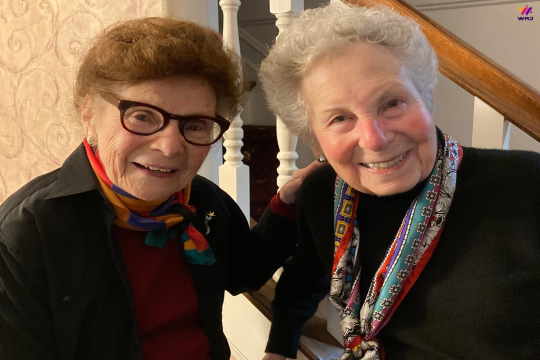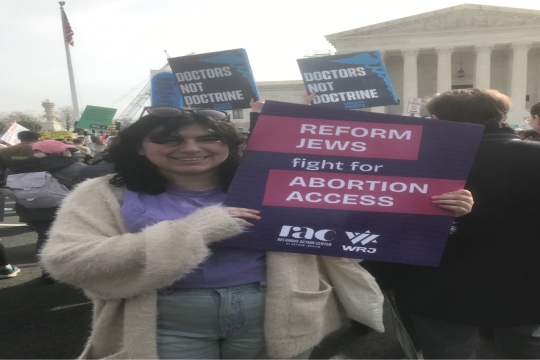by Sara Eiser
This speech was delivered at a Circle of Service YES Fund dinner honoring Sara at Congregation Shaarai Shomayim in Lancaster, PA.
When Rabbi Judith Bluestein died, the entire Cincinnati community mourned. A native of Cincinnati, she had graduated from my high school years before me and been a consummate learner and reader. She had no children and died too young, and after her death her sister was left to decide what to do with her huge rabbinic library. Her sister called Hebrew Union College, and offered all of Rabbi Bluestein's books to us rabbinical students in a beautiful act of generosity. Even more beautifully, I now have a book in my rabbinical library that once belonged to a rabbi I never knew, a way of showing that Jewish learning is truly l'dor v’dor, from generation to generation. All of you who are sitting here tonight know what it’s like to invest in people you don’t know but feel intimately connected to. This is the central tenet of the YES Fund, and we all know and feel its impact. Our URJ camps are strong, the HUC-JIR campus I attend in Cincinnati and the Jerusalem campus I attended last year are beautiful and thriving, and the WRJ is supporting the efforts of ARZA, the Reform Israel Fund, in its run for the upcoming World Zionist Organization elections. In so many ways, your contributions to the YES Fund put each and every one of you at the center of our Movement by supporting our youth, our professionals, and liberal Judaism in the state of Israel. On a much more intimate level, however, your scholarship is changing the rabbi that I will become by helping me to purchase things like books for my rabbinic library. Everyone here who knows me knows that I am seldom seen without my nose in a book, soaking up what to many people may seem like esoteric knowledge about the minutiae of Jewish thought and learning. Far from being esoteric, the knowledge I get from these books has begun to have a ripple effect on the Jewish community at large. These books have allowed me to teach a liturgy class to the members of the congregation I serve in South Dakota, helping them to enrich their prayer lives in a significant way. Using a plethora of prayer books that I’ve purchased from many different Jewish traditions throughout the world, I have been able to show an isolated congregation of 31 families how to better craft prayer services whenever they don’t have the benefit of a rabbi to lead them and how to appreciate services at a different level when they do have a rabbi with them. These books have allowed me to read some of our greatest women scholars, and learn from their wrestling with sexism and inequality in our holiest texts. Instead of rejecting these texts because I could not see myself reflected in them, I have learned from these mothers of feminist text interpretation. They have helped me practice rabbinic thought in a feminist way, eking out what I can use from these texts and building upon them for the generation of women after me. These books have allowed me to become learned and proficient in Hebrew, our sacred language, helping me unlock the doors of Rabbinic text, Medieval Golden Age commentary and liturgy, Jewish philosophy, and Modern Israeli literature. There is a vast world of Hebrew literature to explore and bring to my future congregants, those who ask me to speak, and those who read my writing. Last of my examples, but certainly not least, is that these books are the books that will shape another woman rabbi, very literally changing the face of the rabbinate. Everyone in this room knows that with every woman ordained, Judaism becomes stronger and more able to enrich the totality of the Jewish community, fight for equality in Israel, and help our girls grow up educated in a world that represents their humanity. I have been plugged into a great diversity of Jewish life and thought thanks to the library I’m building with your help. Perhaps most poignant, someday when I’m gone I can hope that a rabbi somewhere far in the future will receive a book or two with the bookplate “From the library of Rabbi Sara Eiser,” and this uniquely Jewish cycle of passing Torah on to the next generation will continue. You were the community who passed Torah to me very literally when you welcomed me into the Jewish people, and through the Circle of Service you continue to do so even though we're now in different states. May you all be rewarded for your generosity with a strong movement and strong leaders. Mamash todah, thank you all for your continued support of our leadership through the YES Fund. Sara Eiser is a second year rabbinical student at HUC-JIR in Cincinnati, OH and the former cantorial soloist of Congregation Shaarai Shomayim in Lancaster, PA. She lives in Cincinnati with her husband Keith and her three children.
Related Posts

Celebrating 100 Years: A Journey Through Time
Celebrating the Mothers of Israel: A Women’s Seder

